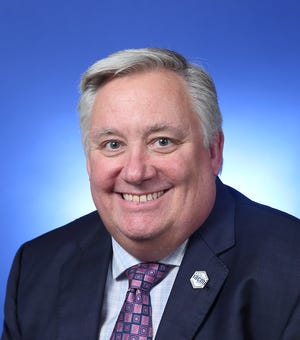Advanced materials have applications in electric vehicles, aerostructures, wind energy, recycling, infrastructure such as America’s deteriorating bridges and more.
Dale Brosius
Editor’s Note: This opinion analysis by IACMI CEO Dale Brosius appeared in the Knoxville News Sentinel on June 1.
Since 2015, as part of an organization devoted to accelerating innovations in technology, materials and manufacturing, it’s been exciting to witness a true paradigm shift in Tennessee’s economic and technological landscape.
The multi-billion-dollar investments flowing into the state from global automakers like General Motors, Ford and Volkswagen for next-generation electric vehicle production will undoubtedly serve as an engine of our state’s economy for generations to come.

A less-heralded but important story is unfolding right here in East Tennessee: the Knoxville area is rapidly becoming an epicenter for innovations in advanced materials, most notably composites and carbon fiber, that have far-reaching promise for our economic future.
Today, there are more than 50 companies in our state that are operating on the cutting edge of research, development and deployment of advanced materials and their applications in electric vehicles, aerostructures, wind energy, recycling, infrastructure and more. The amazing growth in this arena has leading experts now referring to Eastern Tennessee as the Carbon Valley.
Seemingly small but important examples of Tennessee-led innovation in this area abound. This past year, for example, Morgan County commissioned a new vehicular bridge — built with a fiber-reinforced polymer composite deck — that could point the way to a more sustainable approach to rebuilding our nation’s crumbling infrastructure.
Knoxville’s Composites Application Group
Jeff McCay, CEO of the Knoxville-based Composite Applications Group, an IACMI member company, was at the center of it. McCay was aware of the benefits of a composite bridge, offering a better strength-to-weight ratio (90% lighter than concrete), faster and easier installation, resistance to corrosive elements and superior durability, with at least a 100-year lifespan. All that was needed was a real test case to prove this technology could be applied to the 150,000 deteriorating bridges across the United States. In 2021, McCay got his opportunity.
Through IACMI’s network, CAG partnered with the road superintendent from Tennessee’s Morgan County and about a dozen public-private organizations to replace a damaged decades-old concrete crossing with a 16-foot smart bridge. In less than a day, two 8-foot, pre-manufactured, composite bridge decks were installed with sensing equipment provided by Luna Innovations and embedded by University of Tennessee, Knoxville engineers and students to gain ongoing performance data. Taking the data gathered from this bridge, McCay has begun discussions with the departments of transportation in Tennessee and Georgia about renewing U.S. infrastructure by producing more of these small rural bridges throughout the Southeast.

The smart bridge is not the only example of how Knoxville-area innovators are reshaping the future. Material innovation that addresses the life cycle of composite products has also taken place in Carbon Valley and can been seen in Volkwagen’s Atlas SUV liftgate. With the help of IACMI members, Volkwagen developed a polymer composite solution that cut the liftgate’s weight by 35% at a cost equal to or lower than steel. IACMI members Carbon Rivers, UTK and Endeavor Composites developed a solution for recycling composite material at the end of its life. Commercialization efforts are going so well that Endeavor Composites expects to grow from a 10-person operation to over 100 in five years because of innovations like these.
The role of the University of Tennessee and ORNL
For years, we’ve been setting the stage for how these dots connect in Carbon Valley, and now they’re coming together. This strategic vision for carbon fiber and composite manufacturing and recycling is exactly what IACMI and our core founding partners — the University of Tennessee and Oak Ridge National Laboratory — have been working towards. Connecting research development, world-renowned engineers, one-of-a-kind advanced materials facilities (the Department of Energy’s Manufacturing Demonstration Facility and the Carbon Fiber Technology Facility at ORNL) with the entrepreneurial spirit of dozens of local companies, IACMI and its member consortium are facilitating advances in infrastructure and transportation.
Big things, as they say, have little beginnings. As our state’s leaders consider policies to support the long-term health and prosperity of our economy, we hope they will take note of the incredible revolution in materials and manufacturing taking place here in East Tennessee’s Carbon Valley and its implications for our future as a leader in sustainable innovations on the global stage.
Dale Brosius is the chief executive officer and chief commercialization officer of the Institute for Advanced Composites Manufacturing Innovation headquartered in Knoxville. Established by the U.S. Department of Energy in 2015, IACMI – The Composites Institute is one of 16 Manufacturing USA innovation institutes created to secure U.S. global leadership in advanced manufacturing through large-scale public-private collaboration on technology, supply-chain and workforce development.
